Enhancing Safety and Efficiency: The Benefits of an Electronic Risk Register in CHOs
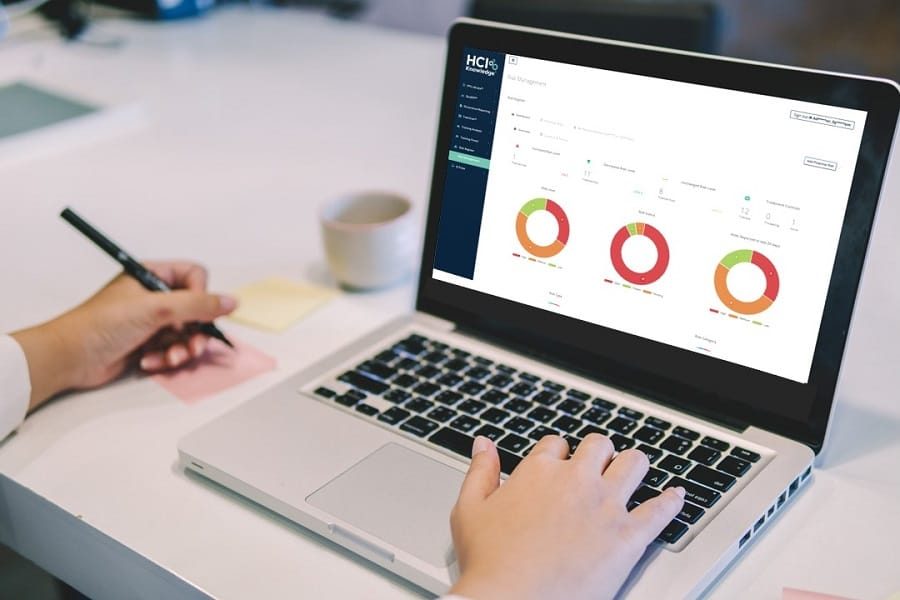
Introduction
In today’s rapidly evolving healthcare landscape, Community Healthcare Organisations (CHOs) face a multitude of risks that can significantly impact the well-being of service users and the overall operational efficiency of the service. To address these challenges effectively, it’s crucial to have a comprehensive and dynamic risk management system in place. One essential tool to support the management of risks in CHOs is an electronic risk register.
In this blog, we will explore the numerous advantages of implementing an electronic risk register within a Community Healthcare Organisation and highlight the benefit of HCI’s Risk Register to support this function.
Centralised Data Management
One of the primary benefits of using an electronic risk register is the centralisation of data. Traditional risk management methods often rely on paper-based documentation or disjointed spreadsheets, making it challenging to access and manage data efficiently. Electronic risk registers allow for a single, centralised system to store and organise all organisational risks. This streamlines data management, making it easier for the Management Team and staff to access critical information, track changes, and collaborate effectively.
HCI’s Risk Register acts as a centralised log to record all organisational risks. For each risk, key details are collected, including the type of risk, the risk category, the source, the current status, the risk level, escalation status, and the date.
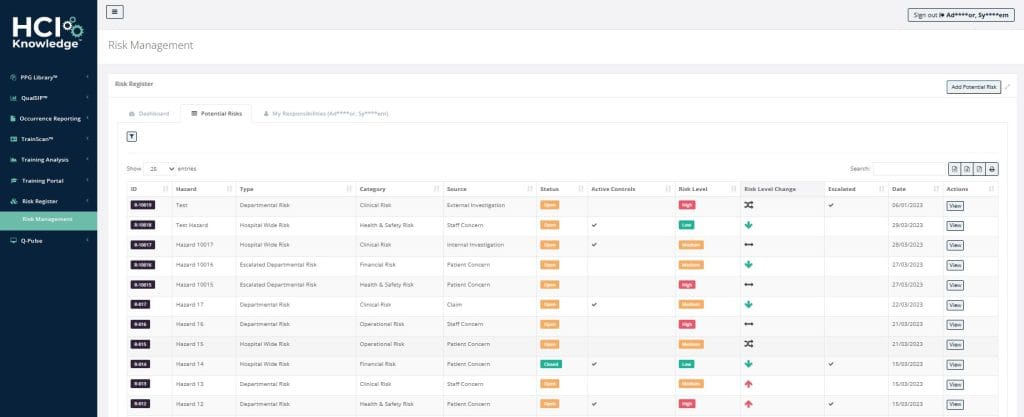
Real-Time Risk Monitoring
Given the broad scope of Community Healthcare Organisations services, CHO’s are constantly exposed to various risks, from service user safety issues to regulatory compliance challenges. An electronic risk register provides real-time monitoring capabilities, allowing healthcare professionals to stay updated on emerging risks and respond swiftly. This real-time awareness enables proactive risk management and can help prevent potential crises.
Within HCI’s Risk Register, the Management Team and staff have the ability to search and filter the risks, helping to identify those that are of critical importance. The Management Team also have a dashboard feature that provides a high-level view of the number of risks, their risk level and risk status, and those that are reported in the last 30 days. This information helps the Management Team to make timely and informed decisions.
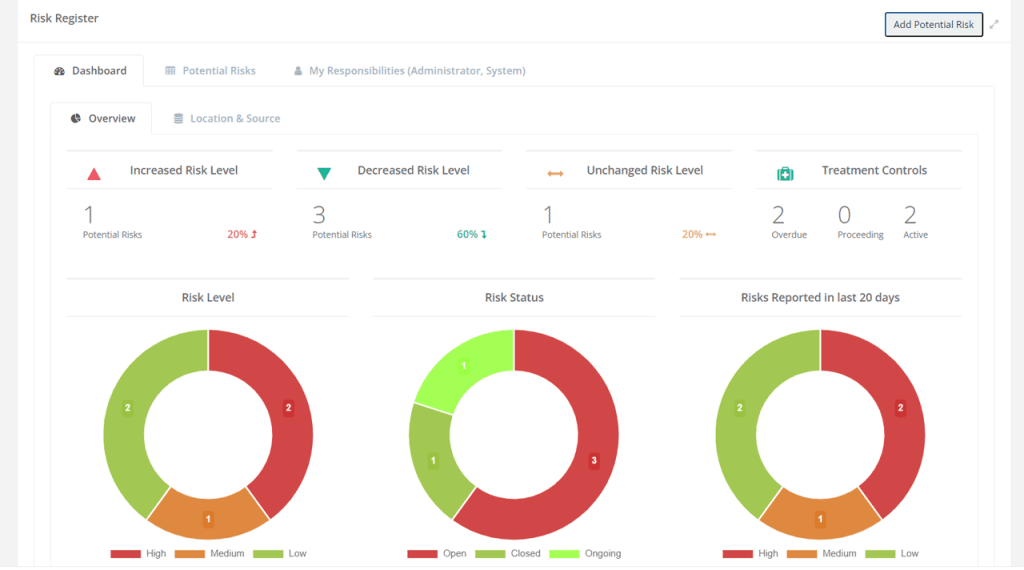
Streamlined Reporting
The ability to generate customised reports and dashboards is another significant advantage of an electronic risk register. Within HCI’s Risk Register, CHOs can easily generate pdf or excel reports for various stakeholders, such as board members and regulatory bodies as well as Management and Team Meetings. This not only saves time but also ensures that the information presented is accurate and up-to-date.
Improved Risk Identification
An electronic risk register facilitates the identification of risks through the use of risk assessment tools and predefined risk categories. It helps healthcare professionals categorise and prioritise risks, ensuring that the most critical issues are addressed promptly. By streamlining risk identification, healthcare organisations can allocate resources more efficiently to mitigate high-priority risks.
In HCI’s Risk Register, staff can conduct a risk assessment utilising the HSE Risk Assessment Tool. They can assign controls to the risk and a person responsible for managing the risk. The record will also hold an activity log to record the management of the risk.
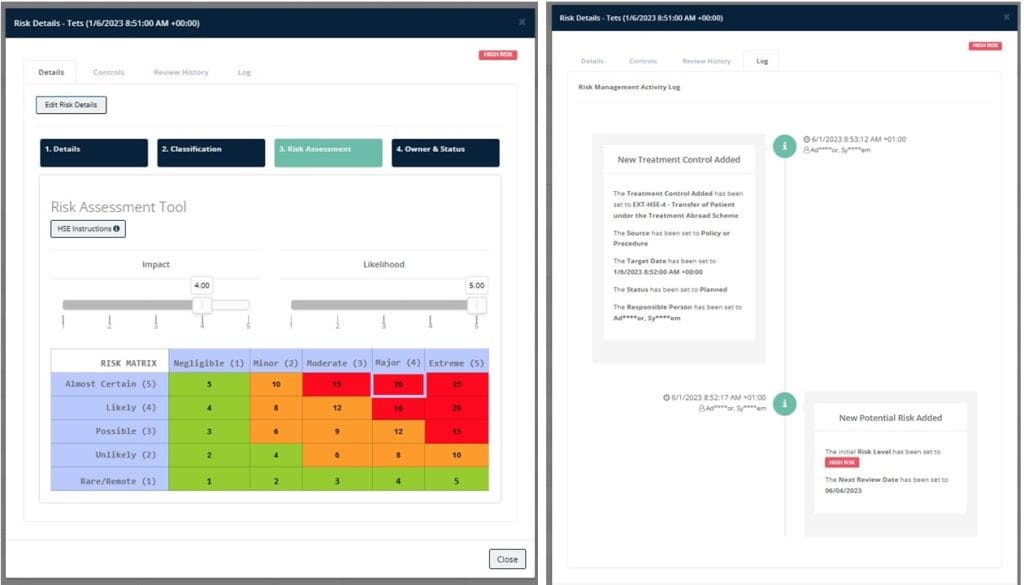
Data Analysis and Trend Identification
Electronic risk registers are equipped with data analysis tools that can help CHOs identify trends and patterns in risk data. This enables healthcare professionals to take a proactive approach to risk management.
Enhanced Accountability
Electronic risk registers provide clear accountability by tracking and documenting the responsible parties for risk mitigation and prevention measures. This accountability ensures that risks are not neglected or overlooked and that actions are taken promptly to address them.
Within HCI’s Risk Register, not only does it allow you to record the risk owner and responsible parties, there is an additional feature for staff to view their risk responsibilities. This makes it easy for staff to find the risks relevant to them, and ensure they are managed appropriately.
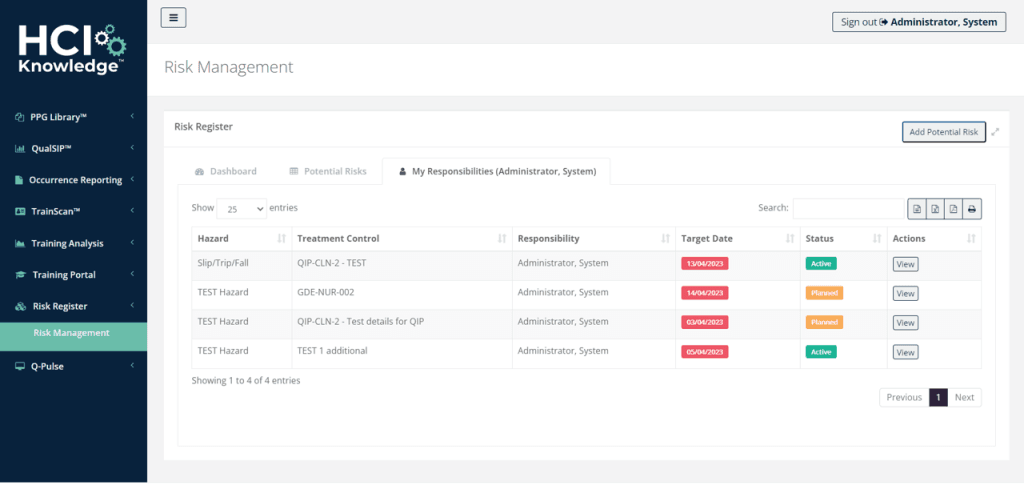
Collaborative Risk Management
Electronic risk registers promote collaboration among healthcare professionals and staff. They enable cross-functional teams to work together on risk mitigation strategies, share insights, and ensure that risk management efforts are well-coordinated.
HCI’s Risk Register allows for centralised oversight of risks across departments, services and the organisation. This means that teams can collaborate to manage risks and Management has better oversight of these risks.
Conclusion
In the complex environment of Community Healthcare Organisations, risk management is a necessity. An electronic risk register offers a comprehensive, streamlined, and efficient approach to managing risks. It empowers healthcare professionals to identify, assess, and mitigate risks in real time, improving service user safety, regulatory compliance, and operational efficiency. By investing in an electronic risk register, CHO’s can have a centralised system which helps to create safer, more efficient services for both service users and staff.
For almost two decades, HCI have supported health and social care providers to implement Quality Management Information Systems which help to digitally transform their quality and safety processes. With our electronic Risk Register you can transform your risk management function. You will have a governance tool that provides centralised oversight of risks, allowing you to get ahead of potential issues and proactively work to identify controls that can minimise risks and support the delivery of safe care.
If you would like further information on the Risk Register Portal or assistance with Risk Management contact HCI at +353 (0)1 629 2559 or email info@hci.care.